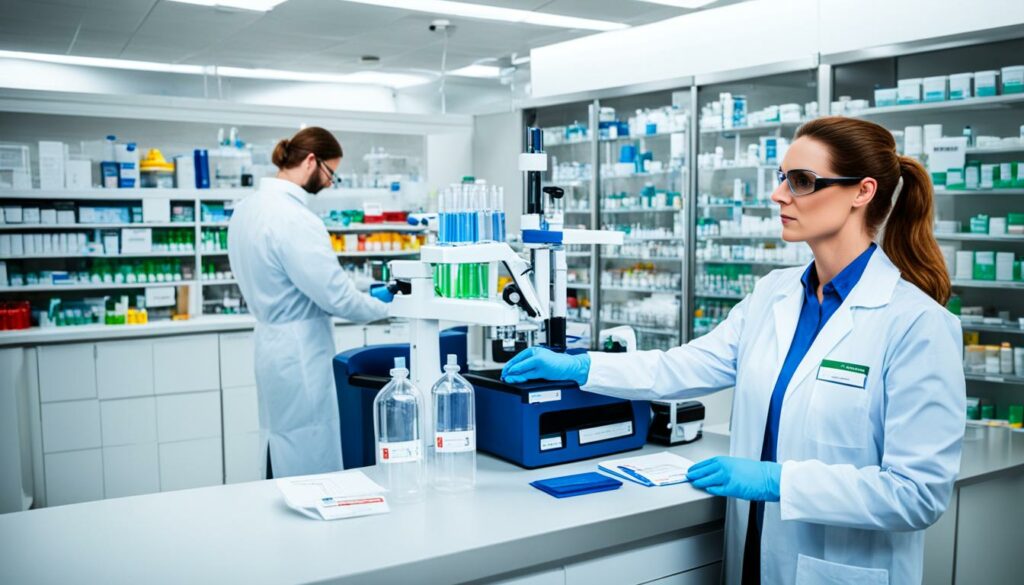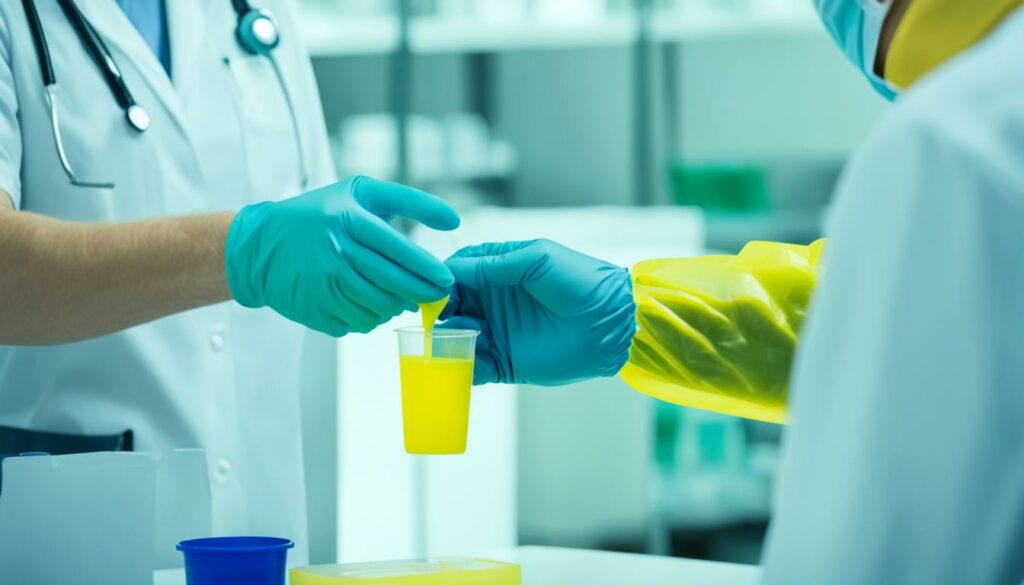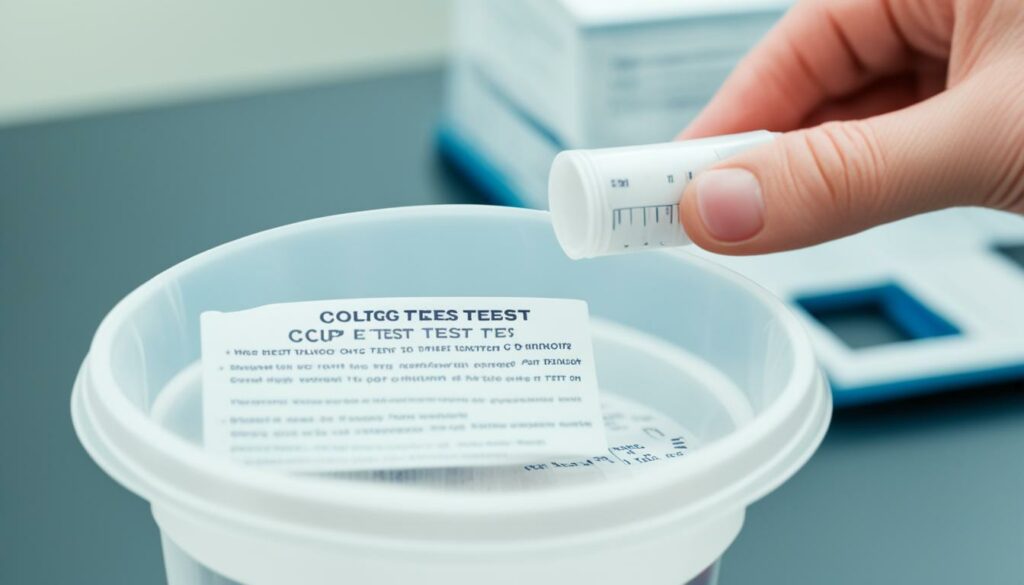Originally posted on February 10, 2024 @ 6:28 pm
Are you considering a job at a grocery store and wondering if they conduct drug tests? The answer may vary depending on the store chain and their specific policies. In this article, we will explore the topic of drug testing in grocery stores and provide you with valuable insights.
Table of Contents
Key Takeaways:
- Grocery store drug testing policies differ among different chains.
- Some larger grocery chains, like Safeway and Kroger, have strict drug testing policies.
- Smaller chains like Trader Joe’s and Aldi may have minimal drug testing requirements.
- Understanding the substances tested for and the notification process is crucial for job seekers.
- Several major companies, including Whole Foods Market and Trader Joe’s, do not drug test their employees.
Which Grocery Store Chains Drug Test?

When it comes to grocery store drug testing policies, different chains have different approaches. While some grocery stores have strict drug testing policies in place, others have more lenient or minimal testing requirements. Let’s take a closer look at drug test policies for a few major grocery store chains:
Safeway
Safeway is known for its comprehensive drug testing policy. They drug test 100% of their employees, including pre-employment testing and testing after workplace incidents. This means that all Safeway employees are subject to drug testing throughout their employment.
Kroger
Kroger is another grocery store chain that performs drug testing. They check for a variety of substances to ensure a drug-free workplace. Similar to Safeway, Kroger conducts pre-employment drug testing and may also perform testing after workplace incidents.
Whole Foods
While Whole Foods Market does not typically drug test all of its employees, they may require drug testing for certain positions or in the case of workplace injuries. The specific drug testing policy may vary depending on the position and circumstances.
Trader Joe’s and Aldi
Trader Joe’s and Aldi have relatively minimal drug testing policies compared to some other grocery store chains. Only some locations of these chains conduct drug tests, and it’s not a standard practice for all employees.
It’s important to note that drug testing policies can change over time and may vary between different locations of the same grocery store chain. If you’re applying for a job at a grocery store, it’s a good idea to familiarize yourself with the specific drug testing policy of that particular store.
What Does an Employer Drug Test Look For?

When it comes to drug testing, employer policies can vary. However, for grocery store employees, drug tests typically look for a range of substances that can impair job performance and safety. Some of the common substances tested for in employer drug tests include:
- Marijuana
- Cocaine
- Amphetamines
- Opioids
- Alcohol
Employers may use different methods to conduct drug tests, but saliva and urine tests are commonly utilized. Saliva tests are non-invasive and can detect recent drug use, while urine tests can provide a longer detection window.
It is essential for job applicants to be aware of the substances that are tested for during the employer drug test. Being informed will help them make the right decisions regarding their drug use and ensure a successful job application process.
This image illustrates the importance of understanding the substances that are tested for in employer drug tests.
Do Employers Tell You if You Passed a Drug Test?
When it comes to drug testing for job applicants, it’s natural to wonder if employers notify candidates about the results. Rest assured, employers are usually required to inform job applicants whether they have passed or failed a drug test. This notification allows applicants to proceed with the hiring process if they pass the test or understand the outcome if they don’t.
For those who pass the drug test, it’s a positive sign that they meet the requirements and can continue with the hiring process. On the other hand, if the test yields a positive result, indicating drug use, the applicant is typically not hired for the position.
Employers understand the importance of effectively communicating drug test results to applicants, as it impacts their employment status and overall hiring process. However, it’s important to note that the exact process and timeframe for notifying candidates may vary depending on the employer and specific circumstances.
After an applicant has taken the drug test, it may take some time for the employers to receive and review the test results. This waiting period can be a bit frustrating, but it’s crucial to be patient during this time and wait for the official notification from the employer.
While waiting for the results, it’s important to refrain from reaching out to the employer for updates repeatedly. Rest assured that once they have received the drug test results, they will notify you of the outcome.
“Employers are usually required to inform job applicants whether they have passed or failed a drug test.”
It’s understandable that applicants may be eager to learn about their drug test results. However, it’s essential to maintain professionalism and wait for the official communication from the employer. This ensures a respectful and organized hiring process for both the employer and the applicant.
Now that you know that employers do inform you about the drug test results, you can rest assured and patiently await the notification from your potential employer.
Keep in mind that drug testing policies and notification processes may vary among different companies and industries. It’s always a good idea to familiarize yourself with the specific practices of the company you’re applying to.
Can You Retake a Drug Test if You Fail?

Generally, job applicants cannot retake a drug test if they fail. Most drug tests are accurate, and retesting is typically not allowed to prevent individuals from manipulating the results.
However, if an applicant believes there was a mistake in the test results, they may dispute the results and request a reanalysis of their sample. This process does not involve retaking the test but rather a reevaluation of the original sample.
“While retaking a drug test after failing is not typically allowed, applicants have the right to dispute the results if they believe an error occurred. They can request a reanalysis of their sample to ensure accuracy.”
Understanding the Dispute Process
If an applicant wishes to dispute the results and request a reanalysis, they should follow these steps:
- Notify the employer: Inform the employer that you would like to dispute the results and request a reanalysis.
- Provide evidence: Gather any evidence or documentation that supports your claim of a testing error.
- Submit a written request: Submit a written request to the employer, outlining your dispute and providing the necessary evidence.
- Follow up: Follow up with the employer to ensure that your request is being processed and properly evaluated.
It’s important for applicants to note that the success of a dispute and reanalysis request depends on the specific circumstances and evidence provided. The employer may have their own internal procedures for handling such requests, and it’s essential to comply with their guidelines.
In certain situations, such as legal or contractual obligations, an applicant may have additional options for challenging a failed drug test. Consulting with an attorney or a professional in employee rights may be beneficial in such cases.
Grocery Store Hiring and Drug Testing Trends
Grocery stores have experienced a surge in hiring, especially during the COVID-19 pandemic. As these stores expand their workforce, it’s important to understand the changing landscape of drug testing policies in the industry.
Drug testing policies can vary among different grocery store chains. While some companies still maintain strict requirements for drug testing, others are becoming more lenient in their policies.
One of the main factors influencing these changing policies is the evolving attitudes towards drug use, particularly in relation to cannabis legalization. As more states legalize marijuana for medicinal or recreational purposes, employers are reevaluating their drug testing protocols.
“With the changing landscape of cannabis legalization and attitudes towards drug use, drug testing policies are evolving.”
While it’s important to note that drug testing policies do exist within the grocery store industry, the shift towards more relaxed regulations is becoming increasingly common. This aligns with the growing recognition of individual rights and personal choices in regard to substance use.
To illustrate the contrasting drug testing policies among grocery store chains, consider the following table:
The table provides a glimpse into the diverse drug testing policies of different grocery store chains. It highlights both the strict and lenient approaches taken by various companies in terms of pre-employment drug testing and random testing.
Notable Hiring Trends
While drug testing policies continue to evolve, it’s essential to acknowledge other hiring trends within the grocery store industry. Some of these trends include:
- The implementation of innovative recruitment strategies, such as virtual job fairs and online applications, to attract a diverse pool of candidates.
- The emphasis on customer service skills and the ability to work in a fast-paced environment as key hiring criteria.
- The increased demand for specialized roles, such as food safety experts, sustainability coordinators, and e-commerce associates, as grocery stores adapt to changing consumer preferences.
Overall, as grocery stores continue to hire extensively, job seekers should be aware of the evolving drug testing policies within the industry. Staying informed about the specific drug testing protocols of different chains can help individuals make informed decisions during their job search.
“Drug testing policies within the grocery store industry are undergoing significant changes, reflecting evolving attitudes towards drug use.”
By understanding the grocery store hiring and drug testing trends, job seekers can navigate the application process confidently and align themselves with companies that match their personal preferences and values.
Companies That Don’t Drug Test Employees
While drug testing policies are common among many companies, there are several big companies that prioritize other factors in the employment process and do not require drug tests for their employees. These companies recognize that drug testing may not be necessary for certain positions and instead focus on qualifications, skills, and experience. Here are some notable companies that don’t drug test their employees:
- Twitter – known for its progressive and inclusive workplace, Twitter does not conduct drug tests as part of their hiring process.
- Whole Foods Market – a leading grocery store chain, Whole Foods does not typically drug test its employees, aligning with its mission of promoting a healthy lifestyle.
- Trader Joe’s – another popular grocery store chain, Trader Joe’s has a relaxed drug testing policy and does not routinely test its employees.
- Michaels – a well-known arts and crafts retailer, Michaels does not require employees to undergo drug tests.
In addition to these companies, other notable names with relaxed drug testing policies include:
- Sprouts Farmers Market – a grocery store chain that emphasizes natural and organic products.
- Bed Bath & Beyond – a leading home goods retailer.
- Planet Fitness – a popular gym chain.
These companies understand that drug testing policies may not be necessary or applicable to all positions and prioritize other factors in their employment process. It is important for job seekers to research and understand the specific drug testing policies of companies they are interested in to make informed decisions.
Considerations for Job Seekers
As a job seeker interested in positions at grocery stores, it’s crucial to be aware of the potential for drug testing during the hiring process. To ensure a smooth application process, it’s important to prepare and understand the drug testing policies of specific grocery store chains.
One of the first considerations for job seekers is refraining from drug use while actively seeking employment. By abstaining from drug use, you can avoid any potential issues that may arise during the hiring process, such as failing a drug test. Remaining drug-free demonstrates your commitment to being a responsible and reliable employee.
To make informed decisions about job opportunities, it’s essential to familiarize yourself with the drug testing policies of specific grocery store chains you are interested in. Some stores have strict drug testing policies, while others may have more lenient or selective testing requirements.
Here is an example of the drug testing policies at three popular grocery store chains:
| Grocery Store Chain | Drug Testing Policy |
|---|---|
| Safeway | Requires 100% employee drug testing, including pre-employment and post-incident testing. |
| Kroger | Performs drug testing and checks for a variety of substances. |
| Whole Foods Market | May require drug tests for certain positions or in the case of workplace injuries. |
By understanding the drug testing policies of different grocery store chains, you can make informed decisions about where to apply and potentially avoid surprises during the application process.
Additionally, it’s important to note that drug testing policies can change over time. Some grocery stores may be becoming more lenient in their drug testing requirements, while others may maintain strict policies. Stay updated on industry trends and changes to ensure you are aware of the current landscape.
Overall, being aware of the potential for drug testing, refraining from drug use, and understanding specific grocery store chain policies are key considerations for job seekers interested in working at grocery stores.
Remember, by being well-informed and making mindful choices, you can increase your chances of success in the job application process and secure the position you desire.
Conclusion
In conclusion, drug testing policies for employees in grocery stores can vary significantly between different chains. While some stores, like Safeway and Kroger, have strict drug testing protocols that apply to all employees, others, like Whole Foods Market, have more lenient policies. It is crucial for job seekers to familiarize themselves with the drug testing policies of the specific store they are applying to, as this knowledge can greatly impact their chances of securing employment.
Understanding the substances that are typically tested for is also valuable information for job seekers. Commonly, drug tests for grocery store employees screen for marijuana, cocaine, amphetamines, opioids, and alcohol. By abstaining from drug use during the job hunting process, applicants can avoid potential complications arising from failed drug tests.
Moreover, being aware of the notification process for test results is crucial for job seekers. Employers typically inform applicants whether they have passed or failed a drug test. If an applicant fails the test, it could result in the withdrawal of a job offer. Consequently, being patient and allowing ample time for employers to receive and review the results is essential.
To maximize their chances of securing employment in the grocery store industry, job seekers should stay well-informed about drug testing policies, the substances tested for, and the notification process for test results. By being knowledgeable and prepared, applicants can navigate the job application process effectively and increase their chances of success.
FAQ
Do grocery stores drug test their employees?
Some grocery stores do drug test their employees, particularly larger chain stores. However, drug testing policies may vary among different grocery store chains.
Which grocery store chains drug test?
Safeway and Kroger are two grocery store chains that drug test their employees. Whole Foods may also require drug tests for certain positions or in the case of workplace injuries. Trader Joe’s and Aldi have minimal drug testing policies, with only some locations conducting tests.
What does an employer drug test look for?
Employer drug tests for grocery store employees typically look for a range of substances, including marijuana, cocaine, amphetamines, opioids, and alcohol. Saliva tests are commonly used, although urine tests may also be administered.
Do employers tell you if you passed a drug test?
Yes, employers are usually required to inform job applicants whether they have passed or failed a drug test.
Can you retake a drug test if you fail?
Generally, job applicants cannot retake a drug test if they fail. However, if an applicant believes there was a mistake in the test results, they may dispute the results and request a reanalysis of their sample.
What are the current trends in grocery store hiring and drug testing?
With the changing landscape of cannabis legalization and attitudes towards drug use, drug testing policies are evolving. Some companies are becoming more lenient in their drug testing policies, while others maintain strict requirements.
Which companies don’t drug test their employees?
Several big companies, including Twitter, Whole Foods Market, Trader Joe’s, and Michaels, do not drug test their employees. Other companies, such as Sprouts Farmers Market, Bed Bath & Beyond, and Planet Fitness, also have relaxed drug testing policies.
What should job seekers consider regarding drug testing?
Job seekers interested in positions at grocery stores should be aware of the potential for drug testing and the substances that are tested for. It is important to refrain from drug use while job hunting to avoid potential issues during the hiring process.
What can we conclude about drug testing in grocery stores?
While some grocery stores may require drug testing for their employees, the policies vary among different chains. It is important for job seekers to be aware of the drug testing policies of the specific store they are applying to.
Source Links
- https://thegrocerystoreguy.com/do-grocery-stores-drug-test/
- https://thetruenegative.com/blog/articles/do-grocery-stores-drug-test
- https://finance.yahoo.com/news/25-big-companies-don-t-191441510.html
See also:
Leave a Reply